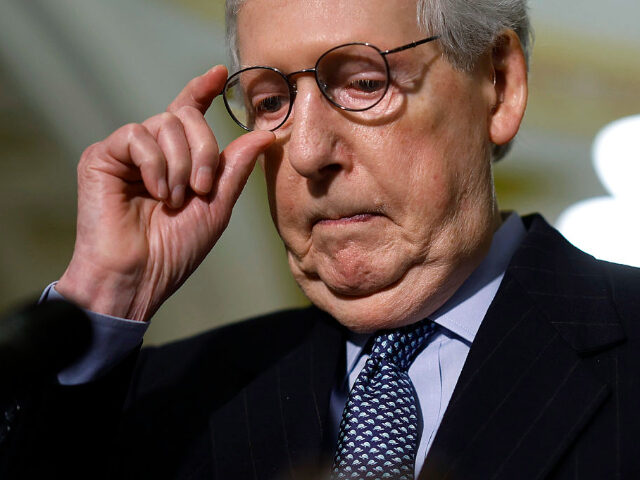The winner between Kentucky Gov. Andy Beshear (D) and Attorney General Daniel Cameron (R) in November could determine control of the U.S. Senate as Beshear argues that a state law requiring him to appoint a Republican if Sen. Mitch McConnell (R) steps down is unconstitutional.
Voters will decide between Beshear and Cameron as Kentucky’s chief executive on November 7. The Democrat incumbent leads his Republican challenger, but Cameron is within striking distance. Beshear’s strategy is to portray himself as a moderate, but the question of which party controls the U.S. Senate could hang in the balance as the current majority leader of the Senate, Chuck Schumer (D-NY), is anything but moderate.
Senate Minority Leader McConnell’s health scares over the past year — resulting in a couple of on-camera freezes — have led to necessary conversations about possible succession if the 81-year-old senator is unable to finish his term. His seat is up in 2026.
Watch: Mitch McConnell Freezes Mid-Speech, Led Away from Podium
C-SPANThe Seventeenth Amendment to the U.S. Constitution provides that when a Senate seat becomes vacant, the governor of the state shall declare a special election. It also includes, “That the legislature of any State may empower the [governor] to make temporary appointments until the people fill the vacancies by election as the legislature may direct.”
In other words, the Constitution requires a special election to fill a Senate term and empowers the legislature with the option of authorizing the governor to make temporary appointments. The governor has no inherent constitutional authority to fill Senate vacancies; it is up to the state legislature.
In March 2021, Kentucky adopted a law saying that if a U.S. Senate seat became vacant, the leadership of the senator’s party would provide the names of three members of that same party to the governor and that regardless of the governor’s party affiliation, he must choose from the three names of the former senator’s party.
Bott Kentucky senators — McConnell and Rand Paul — are Republicans. Under Kentucky law, that means that if McConnell cannot finish his term, Beshear would have to choose from among three Republicans that the Kentucky GOP would name.
But Beshear initially vetoed that legislation, SB 228, saying it violated Article 152 of the Kentucky Constitution, which gives Beshear complete authority to name anyone he wants to the Senate — including a fellow Democrat.
The Republican-controlled Kentucky legislature disagreed, and overrode his veto, making SB 228 law in the Bluegrass State.
Many would say there should not be any debate as a matter of constitutional law. The U.S. Constitution is the Supreme Law of the Land, and Article VI of the Constitution explicitly says that it overrides state constitutions. The office of the U.S. senator is created by the U.S. Constitution, which means all the qualifications, elections, removals, and features of the office are defined by the Federal Constitution.
So if the U.S. Constitution says that the Kentucky legislature gets to decide whether to empower the Kentucky governor to fill a vacancy in the U.S. Senate, and the Kentucky legislature says that the governor can do so only if the appointee is of the former senator’s party, then it does not matter if the Kentucky Constitution seeks to give the governor broader power. But that would be the issue in a protracted court fight.
Thus there is nothing to stop Beshear from trying, and it could more than a year for the issue to be fought out in court all the way up to the U.S. Supreme Court. In the meantime, with a 51-49 Senate and many senators of advanced age, control of the chamber could hang in the balance.
So the stakes for the race between Beshear and Cameron are higher than many voters realized. They may be deciding whether President Joe Biden can continue to rely on his liberal ally Schumer to push a Democrat agenda and stymie the efforts of House Republicans to push conservative legislation. The scales of national power could be tipped by Kentucky’s choice for governor.
Breitbart News senior legal contributor Ken Klukowski is a lawyer who served in the White House and Justice Department.

COMMENTS
Please let us know if you're having issues with commenting.